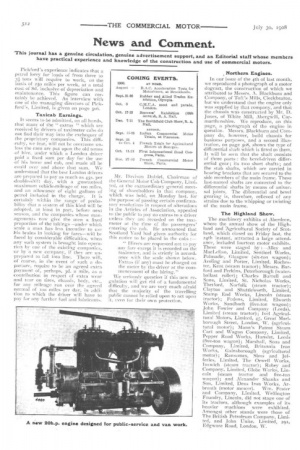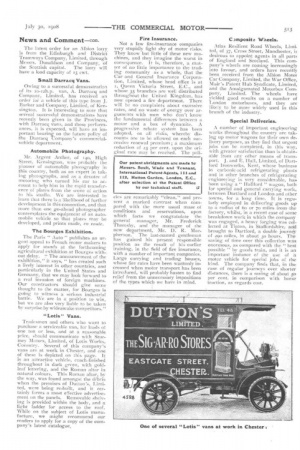News and Comment.
Page 10

Page 11

If you've noticed an error in this article please click here to report it so we can fix it.
This journal has a genuine circulation, genuine advertisement support, and an Editorial staff whose members have practical experience and knowledge of the construction and use of commercial motors.
Pickford's experience indicates that a petrol lorry for loads of from three to 1,-1tons will require to work, on the basis of 250 miles per week, at a total cost of 8d. inclusive of depreciation and maintenance, This figure can certainly be achieved. An interview with one of the managing directors of Pickford's, Limited, is given on page so6.
Taxicab Earnings.
It seems to be admitted, on all hands, that many of the " extras " which are received by drivers of taximeter cabs do not find their way into the exchequer of the proprietary companies. This ditli-cultv, we fear, will not be overcome unless the men are put upon the old terms -of hire, under which a London driver paid a fixed sum per day for the use -of his horse and cab, and made all he could over and above that sum. We understand that the best London drivers are prepared to pay as much as 45s. per .double-shift day, with a guaranteed maximum vehicle-mileage of ion miles, and an allowance of eight gallons of
petrol included in the charge. It is -certainly within the range of probability that a system of this kind will be _adopted, at least in part, befiire next season, and the companies whose managements now give the men a fixed proportion of the takings —under which scale a ITTall has less incentive to use his brains in looking for fares—will be faced by considerable difficulties, when any such system is brought into operation by one of the existing companie,;,. or by a new company, if they are unprepared to fall into line. There will, -of course, in the event of such a departure, require to be an agreed extra payment of, perhaps, 3d. a mile, as a -contribution in respect of extra wear and tear on tires, chassis, body, etc., for any mileage run over the agreed normal of Too miles per day, in addition to which the driver will have to pay for any further fuel and lubricants.
Mr. Dayison Dalziel, Chairman of the General Motor Cab Company, Limited, at the extraordinary general meeting of shareholders in that company, which was held, on Monday last, for the purpose of passing certain confirmatory resolutions in respect of alterations in the Articles of Association, appealed to the public to pay no extras to a driver unless they are recorded on the taximeter at the time of the passengers' entering the cab. He announced that Scotland Yard had given authority for this notice to be placed in the cabs :—
" I irers are requested not t.3 pay
any fare except it is recorded on the taximeter, and is strictly in accord ance with the scale shown below.
Extras (if any) must be charged on the meter by the driver at the com mencement of the hiring."
We seriously question if this new regulation will get rid of a fundamental difficulty, and we are very much afraid that the majority of the travelling public cannot he relied upon to act upon it. even for their own protection.
Northern Engines.
In our issue of the 4th of last month, we reproduced a photograph of a motor dogcart, the construction of which we attributed to Messrs. A. Blackburn and Company, of Toll's Mills, Cleckheaton, hut we understand that the engine only was supplied by that company, and that the chassis was constructed by Mr. I). Jones, of White Mill, Abergwili, Carmarthemshire. We reproduce, on this page, a photograph of the engine in question. Messrs. Blackburn and Company do, however, build chassis for business purposes, and a second illustration, on page 51 i8, shows the type of differential shaft which is fitted to them. It will be seen that the shaft consists of three parts: the bevel-driven differential gear; its two short shafts; and the stub shafts, which are carried in hearing brackets that are secured to the side members of the main frame. These last-named shafts are connected to the differential shafts by means of universal joints. The differential and bevel gearing is, therefore, relieved of any strains due to the whipping or twisting of the main frame.
The Highland Show.
The machinery exhibits at Aberdeen, where the annual show of the Highland and "Agricultural Society of Scotland, which closed on Friday last, the 24th instant, attracted a large attendance, included fourteen motor exhibits. These were staged by : --Alley and MacLellan, Limited, Sentinel Works, Polmadie, Glasgow (six-ton wagon); Aveling and Porter, Limited, Rochester, Kent (steam tractor); Messrs. Barford and Perkins, Peterborough (waterballast roller); Charles Burrell and Sons, Limited, St. Nicholas Works, Thetford, Norfolk (steam tractor); Clayton arid ShuttleWorth, Limited, Stamp End Works, Lincoln (steam tractor); Fodens, Limited, Elworth Works, Sandbach (five-ton wagon); John Fowler and Company (Leeds), Limited (steam tractor); lye! Agricultural Motors, Limited, 4z., Great Marlborough Street, London, W. (agricultural motor); Mann's Patent Steam Cart and Wagon Company, Limited, Pepper Road Works, Hunslet, Leeds (five-ton wagon); Marshall, Sons and Company, Limited, Britannia Iron Works, Gainsborough (agricultural motor); Ransomes, Sims and Jefferies, Limited, The Orwell Works, Ipswich (steam tractor); Robey and Company, Li tinted, Globe Works, Lincoln (steam tractor and five-ton wagon); and Alexander Shanks and Son, Limited, Dens Iron Works, Arbroath (motor mower). Wm. Foster and Company, Limited, Wellington Foundry, Lincoln, did not stage one of its tractors, although examples of its heavier machines were exhibited. Amongst other stands were those of The British Petroleum Company, Limited, and John Unite, Limited, 291, Edgware Road, London, W.
The latest order for an Albion lorry is from the Edinburgh and District Tramways Company, Limited, through Messrs. Donaldson and Company, of
the Scottish capital. The lorry will have a load capacity of I s cwt.
Small Darracq Vans.
Owing to a successful demonstration of its to-12h.p. van, A. Darracq and Company, Limited, has received an order for a vehicle of this type from J. Parker and Company, Limited, of Kensington. It is interesting to note that several successful demonstrations have recently been given in the Provinces, with Darracq vans, and these performances, it is expected, will have an important bearingon the future policy of the Darraeq ompanv 's commercialvehicle department.
Automobile Photography.
Mr. Argent Archer, of 140, High Street, Kensington, was probably the pioneer of automobile photography in this country, both as an expert in taking photographs, and as a devotee of motoring who turned his car to account to help him in the rapid transference of plates from the scene. of action to his studio. We are interested to learn that there is a likelihood of further development in this connection, and that more than one go-ahead photographer contemplates the equipment of an automobile vehicle so that plates may be developed, and prints made, en route.
The Bourges Exhibition,
The Paris " Auto " publishes an urgent appeal to French motor makers to apply for stands at the forthcoming agricultural exhibition at Bourg-es with
out delay. The announcement of the exhibition," it says, " has created such a lively interest in other countries, and particularly in the United States and Germany, that we may look forward to a real invasion of foreign machines. Our constructors should give some thought to the matter, for Bourges is going to witness a serious industrial battle. We are in a position to win, but we are also very liable to be taken by surprise by wideawake competitors."
" Lotis" Vans.
Tradesmen and others who want to purchase a serviceable van, for loads ot one ton or less, and at a reasonable price, should communicate with Sturmey Motors, Limited, of Lotis Works, Coventry. Several of this company's vans are at work in Chester, and one of these is depicted on this page. It is an attractive vehicle, coach-finished throughout in dark green, with goldleaf lettering, and the Roman altar in natural colours. This Roman altar, by the way, was found amongst the dads when the premises of Dutton's, Limited, were being re-built, and it certainly forms a most effective advertisement on the panels. Removable shelving is provided within the body, and a light ladder for access to the roof. While on the subject of Lode manufacture, we might recommend our readers to apply for a copy of the company's latest catalogue. Fire Insurance.
Not a few fire-insurance companies very stupidly fight shy of motor risks. They know but little of these new machines, and they imagine the worst in consequence. It is, therefOre, a matter of no little importance to the trading community as a whole, that the Car and General Insurance Corporation, Limited, whose head office is at t, Queen Victoria Street, E.C., and whose 35 branches are well distributed throughout the United Kingdom, has now opened a fire department. There will be no complaints about excessive rates, and no waste of energy over arguments with men who don't know the fundamental differences between a motor and a box of dynamite. A progressive rebate system has been adopted, on all risks, whereby discounts are to be allowed on each successive renewal premium ; a maximum reduction of 25 per cent, upon the original rate may be reached. The poli cies are remarkably "clean," and present a marked contrast when compared, with the more usual maze of conditions and reservations, upon which • facts we congratulate the general :manager, Mr. Frederick Thoresb-y, and the manager of the new department, Mr. D. R. Macpherson. The last-named . gentleman has gained his present -responsible position as the result of his earlier training, in the field of fire insurance, with a number of important companies. Large carrying and trading houses, whose fire rates have been wantonly increased when motor transport has been introduced, will probably hasten to find relief from the unnecessary impositions of the types which we have in mind.
C Anposit a Wheels.
Atlas Resilient Road Wheels, Limited, of 37, Cross Street, Manchester, is desirous to appoint agents in all parts of England and Scotland. This company's wheels are coming increasingly into favour, and orders have recently been received from the Albion Motor Car Company, Limited, the War Office, Muir's Patent Hub Syndicate, Limited, and the Amalgamated Motorbus Company-, Limited. The wheels have yielded good results on a number of London motorbuses, and they are likely to be more widely used in this branch of the industry.
Special Deliveries.
A number of important engineering works throughout the country are taking up motor wagons for their own delivery purposes, as they find that urgent jobs can be completed, in this way, with greater satisfaction than is obtainable from any other means of transport. J. and E. Hall, Limited, of Dartford Ironworks, Kent, whose business in carbonic-acid refrigerating plants and in other branches of refrigerating engineering is very considerable, has been using a " Halliard " wagon, both for special and general carrying work, between Dartford and London and other towns, for a long time. It is regularly employed in delivering goods up to a radius of (Xi or 70 miles from—the factory, whilst, in a recent case of some breakdown work in which the company was engaged, a heavy forging was collected at Tipton, in Staffordshire, and brought to Dartford, a double journdy of 291) miles, in about 30 hours. The saving of time over this collection was enormous, as compared with the " best possible " by goads train, and it is an important instance of the use of It motor vehicle for special jobs of the kind. The company finds that, in the case of regular journeys over shorter distances, there is a saving of about 50 per cent. in comparison with horse traction, as regards cost.




















